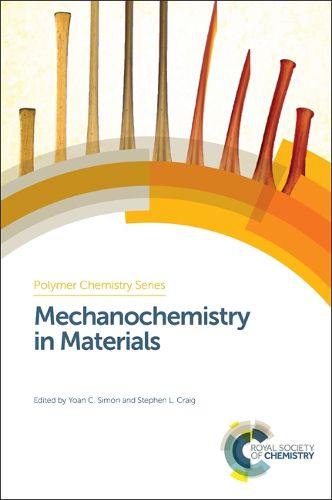Readings Newsletter
Become a Readings Member to make your shopping experience even easier.
Sign in or sign up for free!
You’re not far away from qualifying for FREE standard shipping within Australia
You’ve qualified for FREE standard shipping within Australia
The cart is loading…






With tremendous growth over the last five years, mechanochemistry has become one of the most important topics in current polymer science research. With a particular focus on polymers and soft materials, Mechanochemistry in Materials looks at the subject from the application of macroscopic forces to solid systems of macroscopic dimensions.
The book has been divided according to length scale covering both experimental and theoretical considerations simultaneously. The first section of the book focuses on inspiration from nature, exploring and explaining multiple biological phenomena. The second section discusses molecular mechanochemistry, including the theoretical understanding of the transduction of mechanical force and its impact on covalent bonds cleavage and formation. The final section considers the implementation of these phenomena at the mesoscale and discusses the use of supramolecular/reversible aspects with similarities to biological systems.
The book provides a unique comparison with natural systems and contains all the important achievements in the area from the last decade. Appealing to a broad range of materials scientists, working in industry and academia, this well-presented and comprehensive title will be essential reading for researchers.
$9.00 standard shipping within Australia
FREE standard shipping within Australia for orders over $100.00
Express & International shipping calculated at checkout
With tremendous growth over the last five years, mechanochemistry has become one of the most important topics in current polymer science research. With a particular focus on polymers and soft materials, Mechanochemistry in Materials looks at the subject from the application of macroscopic forces to solid systems of macroscopic dimensions.
The book has been divided according to length scale covering both experimental and theoretical considerations simultaneously. The first section of the book focuses on inspiration from nature, exploring and explaining multiple biological phenomena. The second section discusses molecular mechanochemistry, including the theoretical understanding of the transduction of mechanical force and its impact on covalent bonds cleavage and formation. The final section considers the implementation of these phenomena at the mesoscale and discusses the use of supramolecular/reversible aspects with similarities to biological systems.
The book provides a unique comparison with natural systems and contains all the important achievements in the area from the last decade. Appealing to a broad range of materials scientists, working in industry and academia, this well-presented and comprehensive title will be essential reading for researchers.